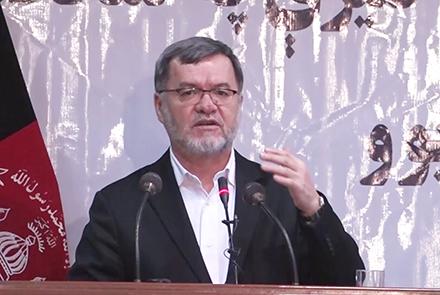While the controversy over the roll out process of Electronic Identity Cards (e-NIC) continues, second vice president Mohammad Sarwar Danish has said that the e-NIC roll out has been taken hostage by some ethnic extremists.
The statement comes a day after CEO Abdullah Abdullah called for more discussions on the political and legal aspects of the process in order to obtain consensus among the Afghan public.
Danish said that all national symbols of the country have been defined in the constitution of Afghanistan, adding that if anyone suggests amending them, the issue must be raised as a constitutional amendment, and not as part of e-NIC.
Meanwhile, officials from the e-NIC department have said that they will soon enter into dialogue with government over the roll out.
But Abdullah on Monday dismissed criticism and said there is still the need for more debate on the legal and political aspects of the process.
“People’s concerns and the worries of different segments of society must be taken into consideration before making a decision in this respect so that it can be a reason for more unity among the people and the people’s firm support of the process,” said Abdullah at the council of ministers meeting on Monday.
But, sources have said on condition of anonymity that the leaders of the national unity government have decided to delay the roll out process of e-NIC until the end of the present government’s term.
“Millions of dollars have been invested in the e-NIC, all people are waiting to see when this process will be started, it has been taken hostage by some ethnic extremists,” said Danish.
Last week sources speaking on condition of anonymity said that the roll out of the electronic identity cards has once again been delayed over political disagreements.
Previously the ousted governor of Balkh Atta Mohammad Noor had expressed his opposition to the nature of the roll out process. Noor had criticized government for not rolling out e-NIC in terms of the law previously approved.
“All national symbols such as the national flag, nationality, national anthem have been defined in the constitution of the country not in a subsidiary law, if anyone wants to suggest amendment in this respect, he should raise it during the constitutional amendment, but not during the rollout of the identity card which is an important process,” added Danish.
e-NIC officials who are not willing to speak on camera have said that they will dispatch an official letter to the presidential palace and ask government for clarification about delaying the process.
“The law has been approved in the joint commission, the identity cards must be rolled out,” said senate chief Fazel Hadi Muslimyar.
Following the establishment of the National Unity Government (NUG), President Ashraf Ghani approved the law for population registration, the census law, in which the inclusion of nationality and ethnicity information was not included.
The law was then criticized by a number of people and the president issued a legislative decree stating that nationality and ethnicity information should be included.
The decree was rejected by the Wolesi Jirga but was approved by Meshrano Jirga, the Upper House of Parliament.
To resolve the disagreements in this regard, a joint committee was formed by parliament and the Senate to decide on the issue. The committee approved the inclusion of nationality and ethnicity in the new electronic national identity cards.
It was expected that the roll-out process of electronic national identity cards would have started on Tuesday. However, a few days ago, rumors surfaced in the media that the process had been delayed because of political disagreements.


